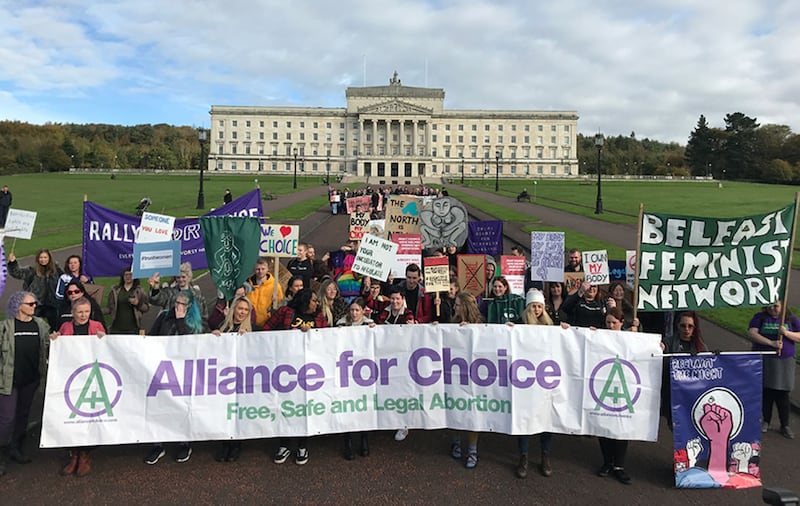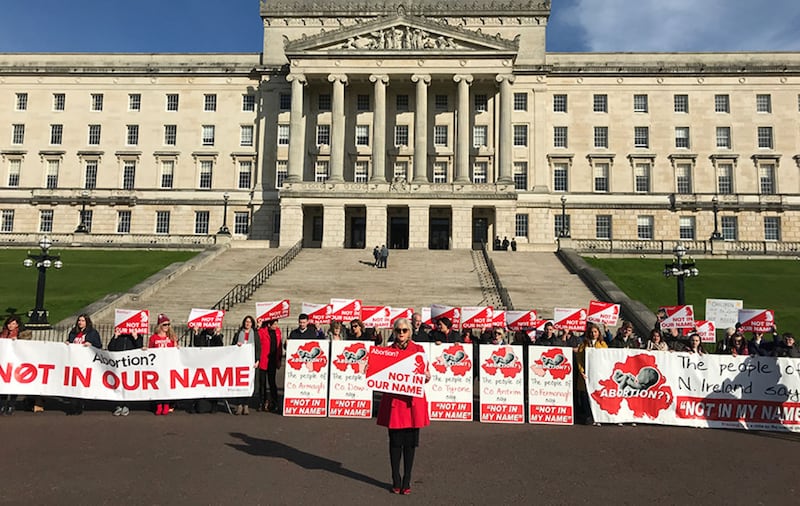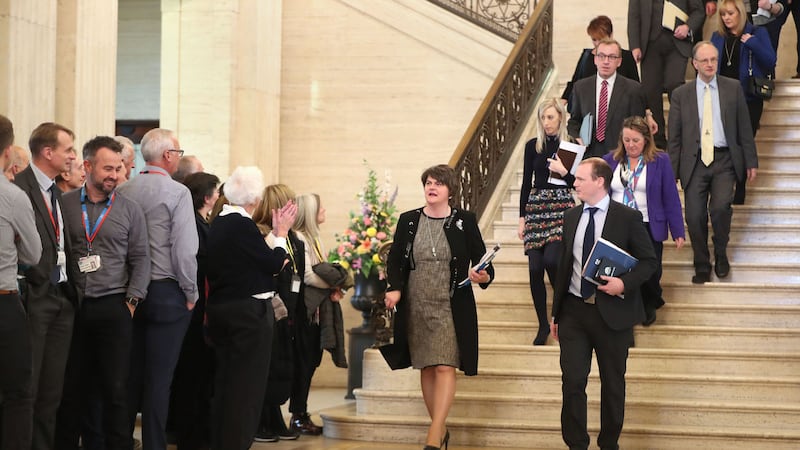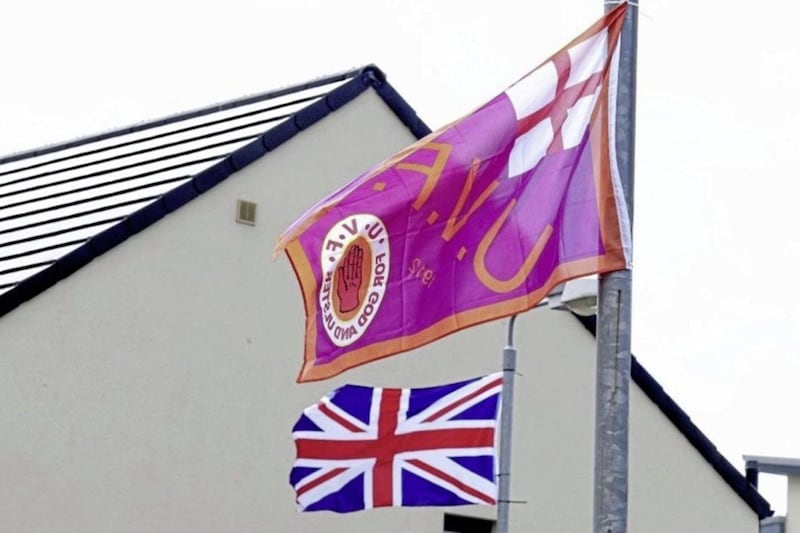Assembly speaker Robin Newton has refused to allow Stormont rules to be changed so that a bill can be introduced to block reform of the north's abortion laws.
As MLAs made an attempt to introduce a Defence of the Unborn Child bill and have it passed today to stop the law changing at midnight tonight, Robin Newton said no business could be done until after the election of a new speaker.
Such an election would require cross-community support. The SDLP, who sat in the assembly for today's proceedings, refused to take part in electing a speaker. Party leader Colum Eastwood described the assembly meeting today as a "stunt" and said the issue of abortion legislation "could have been dealt with at any point over the last 1,000 days."
'It is not over' says Arlene Foster, as she leaves the Stormont chamber after failing to stop the liberalistation of abortion laws in N Ireland.. pic.twitter.com/xVUKS1bvKo
— Mark Simpson (@BBCMarkSimpson) October 21, 2019
DUP Paul Givan MLA had urged the suspension of standing orders to enable the bill to be considered.
Mr Newton said a further sitting of the assembly would be required to consider the bill and highlighted that the suspension of standing orders required cross-community support.
He said it was "not good practice" to take a piece of legislation through in one day.
Here's the moment the SDLP walked out of Stormont to shouts of "shame"@columeastwood: "We will not participate in this stunt any longer" pic.twitter.com/H452H64Q8C
— Daniel Kraemer (@dcakraemer) October 21, 2019
"The assembly cannot do any business until a speaker and deputy speakers are elected," he said.
Mr Givan insisted that advice from Attorney General John Larkin indicated that standing orders could be suspended to allow the legislation to be considered.
Anti-abortion and pro-choice campaigners gathered at the front of Parliament Buildings this morning to voice their contrasting views on the emotive issue.
One by one, the parties who attended Stormont got up and walked out.
— Mark Simpson (@BBCMarkSimpson) October 21, 2019
The Speaker tried to continue but in the end, called it a day.
After less than an hour, it's over. pic.twitter.com/0OcWlKRbO3
Read More: Bernadette Smyth: I may stand for Stormont to fight abortion reforms
The members who signed the 30-strong recall petition insisted having the assembly sit today would provide a forum to voice opposition to the imminent decriminalisation of abortion.
Contrasting viewpoints on the abortion debate expressed outside Parliament Buildings ahead of the first Assembly sitting since March ‘17. Not entirely surprisingly, the start of proceedings at Stormont has been delayed... pic.twitter.com/yx8Gfz3TdA
— David Young (@DavidYoungPA) October 21, 2019
Sinn Féin made clear it would not turn up to a sitting it has described as a circus.
Sarah Ewart, who won a legal battle after she was denied a termination in NI, explains how liberalisation of abortion laws would have helped her: pic.twitter.com/S0PWV3Xqdl
— Q Radio News (@qnewsdesk) October 21, 2019
The abortion law will change in Northern Ireland at midnight on Tuesday when the Executive Formation Act 2019 comes into effect.
DUP leader Arlene Foster said it was a "shameful day".
"This is not a day of celebration for the unborn," she said.
Ms Foster said decriminalisation at midnight would not mark the end of efforts to prevent the introduction of abortion services in the region.
She said her party would explore "every possible legal option" open to it.
Ms Foster said the law change would see Northern Ireland adopt the most liberal abortion regime anywhere in Europe.
Same-sex marriage will also be legalised as a result of Stormont failing to meet.
Marriage equality campaigners held an early celebration at the Merchant Hotel in Belfast ahead of the change to the law.
More than a dozen same-sex couples along with campaigners enjoyed wedding cake following a buffet reception surrounded by flowers and balloons before cheering on the steps of the hotel, many holding signs which read "equal".
The event was organised by the Love Equality campaign, which is led by the Rainbow Project, Amnesty International, Irish Congress of Trade Unions, Cara-Friend, NUS-USI and Here NI.
MPs at Westminster successfully amended the bill in the summer to include measures to end the near blanket prohibition on abortion and introduce same sex marriage.
Read More: Grainne Teggart: 'We’re no longer be treated as criminals for accessing healthcare'
Once the 19th-century laws that criminalise abortion lapse at midnight, the British government will assume responsibility for introducing new regulations to provide greater access to terminations in the north by next April.

In the interim period, women will be offered free transport to access abortion services in England.
Under the Act, same sex marriage will become legal in Northern Ireland in January, with the first wedding expected the following month.
The law changes regarding abortion and marriage could only be stopped if the crisis-hit devolved executive is revived prior to the midnight deadline - a turn of events that is extremely unlikely.
With the rift between erstwhile coalition partners the DUP and Sinn Féin over issues such as Irish language legislation as wide as ever, a deal to restore powersharing still looks a long way off.
Read More: Yvonne Morgan: 'I am so glad abortion was illegal when I had an unplanned pregnancy'
Pro choice activists held aloft cardboard letters spelling out "decriminalised" in front of Parliament Buildings ahead of the sitting.
Sarah Ewart, who has become a vocal advocate for reform since having to travel to England for an abortion after receiving a diagnosis of fatal foetal abnormality, welcomed the law change.

"This law change will not fix what I had to go through but it will make it hopefully better for those who follow after me," she said.
Grainne Teggart from Amnesty International said the law change would pave the way for a more "compassionate" system.
Read More: Sarah Ewart: Right that women with fatal foetal diagnosis are given option of abortion
"From midnight tonight history will be made, these oppressive laws that have policed our bodies and our healthcare will be brought to an end," she said.
"Finally our rights and our healthcare are being brought into the 21st century."
Anti-abortion activists held up placards stating that the decriminalisation was not in their name.
They also prayed beneath the landmark statue of Sir Edward Carson.
Activist Clive Johnston, from Strabane, warned of the consequences of decriminalisation.
"In today's world the most dangerous place to be is actually in the womb of a woman," he said.
"The government is culpable in actually taking part in what amounts to the killing of babies in the womb."
The last time the Assembly sat was March 13, 2017 in the wake of a snap election caused by the implosion of the devolved institutions two months earlier amid a row over a botched green energy scheme.
The sitting was only for the 90 freshly-elected MLAs to sign the roll of membership and the assembly has not reconvened since.
WHAT ARE THE CHANGES TO ABORTION LAW?
While abortion in Northern Ireland is expected to be decriminalised from tomorrow, services to allow terminations will not be introduced immediately.
During an 'interim' period until the end of next March, a 10-week public consultation will take place on how services will be delivered.
However, during this 'limbo' timeframe, there will be:
- Legal abortions for those women who have received a diagnosis of a fatal or serious foetal abnormality
- Women from the north will be able to travel for abortions to England and have their medical, travel and accommodation needs met
- Doctors can inform or signpost women to services by supplying them with a phone number for a "central booking service" in England
- Any previous cases brought in the north under the 1861 abortion act, including that of a mother who bought abortion pills online for her then 15-year-old daughter, will be dropped






